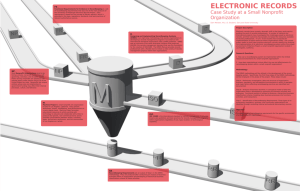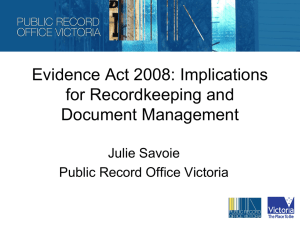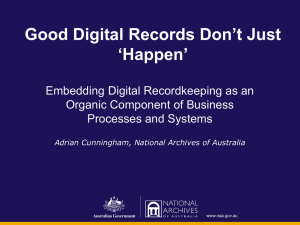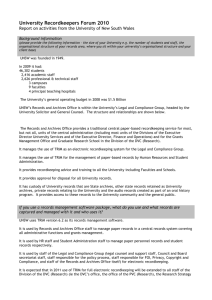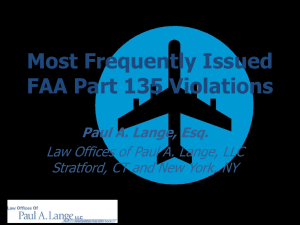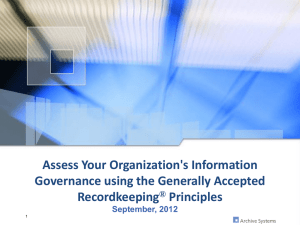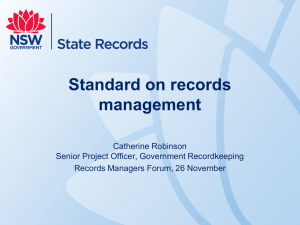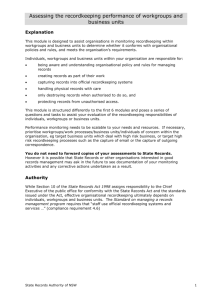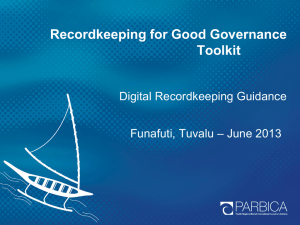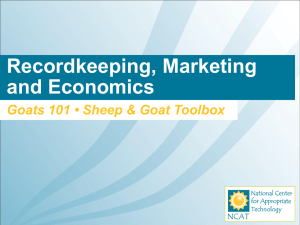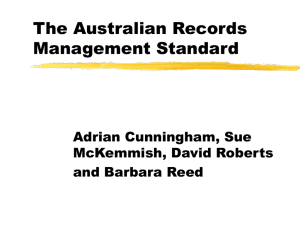the slide show
advertisement
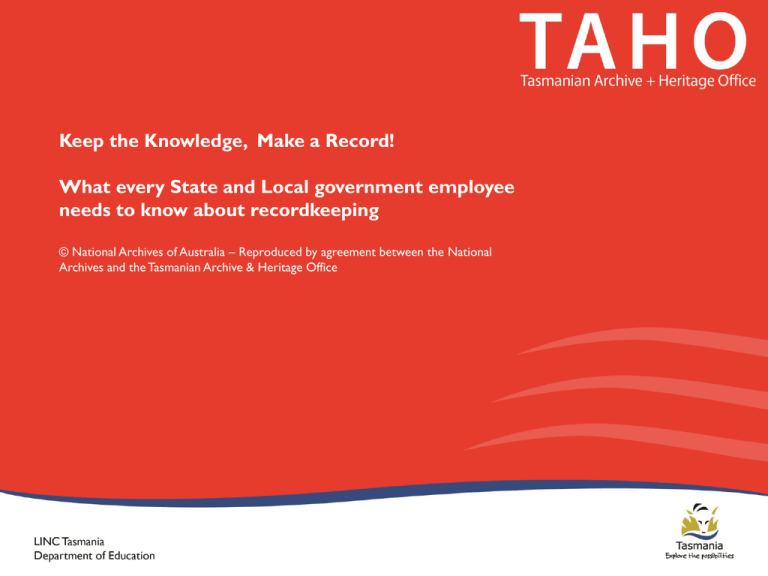
Keep the Knowledge, Make a Record! What every State and Local government employee needs to know about recordkeeping © National Archives of Australia – Reproduced by agreement between the National Archives and the Tasmanian Archive & Heritage Office Topics • Setting the scene • Why is recordkeeping important? • Who is responsible? • What is a record? • What are your recordkeeping responsibilities? • Where to go for help Setting the Scene • Have you been keeping records? • Have you created the right records? • Have you filed them so others can use them? • Will you or other staff be able to find these records when needed? Why is recordkeeping important? Good recordkeeping: • improves operational efficiency • supports public accountability • contributes to corporate memory Good recordkeeping is essential for good government. Who is responsible? All State and local government employees, external contractors and consultants are responsible for making and keeping good records of their activities. What is a record? Records: • provide evidence of business activity • document what we do as State and Local government employees • can be in any format Defined in the Archives Act 1983 What is a business record? Business records provide evidence of your organisation’s business activity. In most circumstances, such records do not include: • very short term or unimportant information such as: reference material, advertising brochures, copies of circulars • personal information What is a recordkeeping system? Recordkeeping systems: • capture records • enable access to records over time • secure records against tampering or unlawful deletion Your recordkeeping responsibilities You should: • make records of what you do • put your records in the recordkeeping system • give your records a meaningful title • maintain business records Your recordkeeping responsibilities You must not: • destroy, delete or alter records without authority • remove business records without permission • lose records that are in your care When should you make a record? Make a record if you need to show: • what happened • what was decided or recommended • what advice or instruction was given • when it happened • who was involved • the order of events and/or decisions Ask yourself these questions Does it relate to my work? • Did I write or send it in the course of my work? • Am I required to act on it? • Is it official correspondence I have received? • Is it something I have used to do my work or to reach a decision? IF YES – MAKE A RECORD! Meetings Make a record of meetings where business decisions are made, irrespective of how the meeting is conducted. • agenda (if any) • minutes and/or notes of the meeting • any records presented at the meeting Oral communications Make a record of work-related discussions where business decisions are made or directions are given, including: • phone calls • voice mail messages • conversations with your supervisor Correspondence Make a record of any internal or external correspondence you send or receive that relates to your work, or is referred to you for action. Notes for file Include: • your name and details of other parties involved • what was discussed or considered • what was decided or recommended • what advice or instruction was given • the date the discussion occurred • the date the note for file was made Where should you keep records? Keep business records in the recordkeeping system, NOT: • in your private store • on external devices • your computer hard drive • in networked folders! Give records a meaningful title To ensure records can be found when needed, give them a meaningful title. Do you have to keep all records? The disposal schedule for short-term value records authorises the disposal of information that is: • duplicated • unimportant • of short-term use Rules for recordkeeping - revision • Recordkeeping is your responsibility • Make a record of any significant business activities you undertake. If in doubt, make a record and put it in the recordkeeping system • Give your records a meaningful title Rules for recordkeeping – revision • Records are assets belonging to your agency • Do not hoard them • Put records in the recordkeeping system • Do not destroy, alter or delete records unless authorised to do so Where to go for help • • • • <your records manager, or equivalent> <phone number and email address> <intranet or other source of recordkeeping information> ‘Government Recordkeeping’ link at http://www.linc.tas.gov.au/global/govtrecordkeeping
